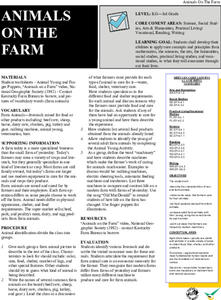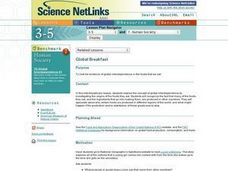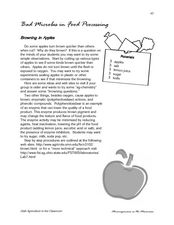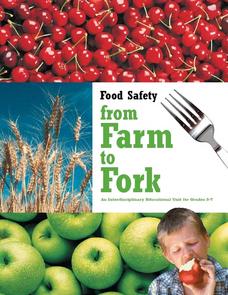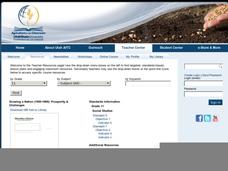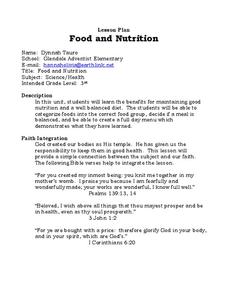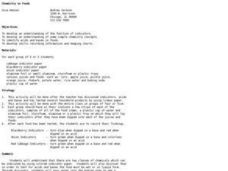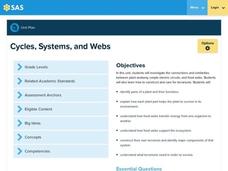Curated OER
Yoko and the Sushi Party
Learners listen to a read aloud of Rosemary Wells, Yoko as they begin a study of Japanese culture and customs. They experience Japanese food, geography and culture. They write a friendly letter to the author.
National Wildlife Federation
Quantifying Land Changes Over Time in Areas of Deforestation and Urbanization
Is qualitative or quantitative research more convincing when it comes to climate change? In the eighth lesson during this 21-part series, scholars begin by performing a quantitative analysis of deforestation and urbanization. Then, they...
Curated OER
Farmers and the Food Connection
Students investigate the process of growing food. In this agricultural lesson, students invite a farmer into their classroom to discuss how they grow and process food. Students participate in learning centers which focus on farming.
Curated OER
Animals on the Farm
Students work in groups to create a description of a farm animal. Other classmates try to guess the animal. The class discusses what farmers need to provide for each animal on their farm (food, shelter, veterinary care). Students...
Curated OER
Global Breakfast
Young scholars explore different cultures. In this global interdependence lesson, students discuss how food is produced and distributed. Young scholars discuss different cultures and foods they eat. Students search the National...
Curated OER
Soul Food
Learners identify foods that they associate with different cultural groups in which they are members and speculate possible connections between specific foods and the cultures in which they are popular. They also explore the importance...
Curated OER
Where Does Food Come From?
Students recognize that food we eat comes from farms. In this where does food come from lesson, students discuss planting crops and how they grow. Students plant seeds for edible crops and eat them when are ripe. Students sing a song...
Curated OER
Looking at Food Labels
High schoolers interpret the food and nutrition on food labels. They determine their nutrient needs and how comprehending food labels can help them to meet those needs. Pupils recall that food labels provide nutrition information to help...
Curated OER
Bad Microbes in Food Processing
Learners complete an experiment to determine if there are bad microbes in food processing.In this bad microbe experiment, students use apples to see how they react to oxygen. Learners test apples with chemicals to observe the changes.
Curated OER
Food Safety From Food To Fork
Students are introduced to the concept of food safety. In groups, they distinguish between fact and opinion and cause and effect while participating in a board game. They write an essay about what knowledge they gained and review the...
Achieve
Ground Beef
Ever wonder how a butcher creates the different types of ground beef? Young mathematicians explore the methods butchers use to create their desired ground beef quality. Given a combination of two types of meat with varying leanness,...
Curated OER
Nutrition and the Media: Cereal Box Consumerism
How many treats do you buy each week? Learners investigate diets and how the media tricks consumers into purchasing unhealthy snacks. They will investigate the designs and logos affiliated with cereal boxes and identify specific phrases...
Agriculture in the Classroom
Growing a Nation (1950-1969): Prosperity & Challenges: The Story of American Agriculture
A wonderful activity on the development and impact of mechanized farming! History or agriculture classes learn the historical background of the United States' food production by creating a pamphlet with information on the cause and...
New York State Education Department
Global History and Geography Examination: January 2010
Agriculture was more revolutionary than some might think. Using a primary source set—including photos of artifacts from Mesopotamia and an amusing comic—learners consider the impacts of the neolithic, agricultural, and green revolutions....
Sharp School
The Jungle Project: Creating a Magazine
To conclude a study of Upton Sinclair's The Jungle, groups create a multi-media magazine in which they investigate one aspect of the foods industry. The packet details the requirements for the project, and includes rubrics for assessing...
Curated OER
Protein Foods
Students examine their protein intake daily. For this adult health lesson, students discover other protein rich foods besides meat. They name examples of vegetarian proteins found in the grocery stores.
Curated OER
Food and Nutrition
Third graders discuss the benefits for maintaining good nutrition and a well balanced diet. They categorize foods into the correct food group, decide if a meal is balanced, and create a full day menu which demonstrates what they have...
Curated OER
Biotechnology, GMOs and Food
Twelfth graders explore controversy around genetically modified foods, identify source of controversy, and role play town hall meeting on genetically modified foods, to examine viewpoints and arguments for and against genetic modification.
Curated OER
Chemistry in Foods
Students investigate foods that are indicators, and acids and bases. In this food chemistry lesson plan, students test household products with litmus paper and with food indicators. They use blackberry, onion and red cabbage indicators...
Curated OER
Sugar-Coating the Facts
Students explore the food industry's influence on American Student nutritional habits and analyze the nutrition charts found on food packaging. They design their own warning labels for foods targeted at Students.
Curated OER
PICTURE PERFECT PYRAMID
Students create a model of the USDA's Food Pyramid Guide, using shoe boxes. They bring an assortment of shoe boxes from home. Students are given a copy of the "Food Guide Pyramid." They wrap boxes for the bread group in white, the...
Curated OER
They Don't Just Eat Grass
Middle schoolers consider the USDA daily recommendations to create a "feed" product for middle schoolers. In this Health lesson, students learn about the ingredients in feed that is fed to livestock and apply the method to creating feed...
Curated OER
Building a Terrarium System
Young scholars create their own terrariums. In this ecological model lesson, students create terrariums using soil, seeds, pebbles, and two liter bottles. Young scholars compare the elements of a terrarium to a food web.
Pennsylvania Department of Education
Cycles, Systems, and Webs
Fourth graders review the parts of the plant and their functions. In this plant lesson plan, 4th graders recognize that plants must transfer energy to make food. Students understand the interdependence of organisms in an ecosystem.





